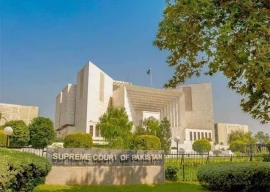
MONTREAL: Canada's immigration minister announced Monday a ban on wearing face coverings such as burka and niqab veils when taking a citizenship oath.
"Starting today, any individual will have to show his or her face when taking the oath of citizenship," Immigration Minister Jason Kenney told a press conference in Montreal.
"Allowing a group to hide their faces while they are becoming members of our community is counter to Canada's commitment to openness, equality and social cohesion," he explained.
The minister cited complaints from citizenship judges and others who said it was difficult to ensure individuals whose faces were covered were really taking the oath.
The new rule largely targets Muslim women, but with a total Muslim population of only 500,000 in a country of 34.5 million and only a trickle of Muslim immigration it is not expected to have a large impact.
Rather, it is widely viewed as another volley in a sometimes baneful public debate over veils in Canadian society.
Currently at airports, veiled Muslim women may opt to show their face only to a female security screener.
They may also vote in elections without showing their face.
However, veils may soon be banned at government workplaces in Quebec, as well as in schools, nurseries and hospitals. The province is considering legislation that would force people to show their face in government-funded institutions or to access public services.
Canada's Supreme Court last week also heard arguments in a case where a Muslim woman wants to testify while wearing a niqab, pitting her right of religious freedom against her alleged rapist's right to face his accuser at trial.
COMMENTS (51)
Comments are moderated and generally will be posted if they are on-topic and not abusive.
For more information, please see our Comments FAQ




























































Seems Alright. OK.
@G. Din: Is this what Islam teaches? u cannot blame Islam for whatever wrong muslims are doing or whatever wrong policies they are formulating.. people themselves are accountable for what they do. Yes, women have high respect and dignity in Islam, but you cannot say the system is flawed if people do not follow. Most of the females who observe pardah do it on their will. its not forced upon them by their family members or whosoever. I am one of those who wear abaya/burqa and its not forced upon me.
@salsa: "@lionheart: muslim men are not supposed to be covered.. According to Islam, pardah (covering of face etc) is for women only, because of their respect and high dignity in an Islamic society" Respect and high dignity? By bullying them at home, by flogging them in public, by stoning them to death, by squirting your urine over their faces, by forcing them to wear a tent over themselves to convert them to a non-entity, by keeping them dependent even though they want to break free reducing them to your personal chattels, by not allowing them to breathe free or soak God's Sun and take a swim in His lakes and streams. Respect and high dignity, indeed! Recently news item from Saudi Arabia: Women having very attractive eyes must take special measures to hide them beyond what is on the law books. Or else what? Have them gouged out?
Why don't pakistani member write same comment here. link text
"China seeks to banish Muslim veil" - Any comments by those who are abusing Canada?
Maybe they should refuse citizenship and they wouldn't have to remove veils. On the whole though I don't get the point of this law
Now, should persons of pakistani origin stop seeking Canadian citizenship.
I agree with the Canadian government decision as do most Muslims in Canada.
@Salman: "Canada has none since they think they are secular and secularism means freedom of everything"
Sorry Secularism does not mean freedom for anything. It means freedom of worship. Canada has not banned mosques.SO they definitely have grounds for their decision.
Any case you consider the fact that a country like KSA will nto even allow a Hindu to carry his holy book the Bhagvad Gita in his home. It is confiscated at the customs. When it comes to Muslim ruled countries yuo want to deny rights to people of other religion - forget dressing even freedom of worship in their own homes. When it comes to Western countries you are unwilling to even lift your veil at the time of citizenship oath. Sorry no-one has appetite for such double standards.
Those are the reasons it is becoming more and more difficult for Pakistani people to get visas to Western countries.
@Jahanzeb: "The standard is teachings of islam which tells hide ur face from Na Mehram so u have to." That's absolytely fine. You simply do not get to become a Canadian citizen.
O'CANADA!!! Go Canada tell them that this is not the country you came from, conform to society or go back! You have been served Islam!
@salsa Excuse me? There is no covering of face for women in Islam. Respect and high dignity...yeah right!
its even in Pakistan!!!! the photographs for passport and C.N.I.C HAVE to be without veil! what about that??
@lionheart: muslim men are not supposed to be covered.. According to Islam, pardah (covering of face etc) is for women only, because of their respect and high dignity in an Islamic society
Burqa or niqaab is the symbol of opression and segregation. Good decision by the Canadian govt
@ABC
haha Can that really be helped?
I understand the points being made; Canadians would have similar freedoms stripped if they were over there. Then again, I guess Canada could step up and lead by example in this aspect of government,
My common sense still doesn't agree with this: "The minister cited complaints from citizenship judges and others who said it was difficult to ensure individuals whose faces were covered were really taking the oath."
I'm sorry, isn't the oath words? Is hearing the words not enough? How many lip readers are present for these oaths, I wonder? It sounds childish. This move seems to imply that the Canadian government is worried about conforming international residents, which would be a petty and silly pursuit indeed. Personally, if I was involved with the Canadian government I would be a little ashamed and flabbergasted by this.
Religion is the opium of commom masses. Karl Max.
Absolutly the right thing to do. How else would you identify someone, I wouldn't be able to differentciate between a Burqa clad women and Burqa clad terrorist.
@lionheart:
Mr where is the gender equality when women bear all the pain in giving birth to the child and men just enjoy the whole scenario
Makes sense.
good one i agree with the canadians on this issue
@ Nero :
Iran, KSA or even Pakistan NEVER claims themselves as secular in fact they proudly calls themselves as an Islamic republic so they have moral grounds to ban a bikini. Canada has none since they think they are secular and secularism means freedom of everything. So gets your facts right!
@xzy, what is bothering you if the face is covered with a bag or not. Is someone complaining if you are not covering some other part of your body without anything !!!
Arabian and other Muslim countries don't allow bikini in their countries , similarly canada doesn't allow burqa . This logic is quite simple . That's their country , their rules are to be followed .
@lionheart, who said the women wearing veils are being forced to by someone. They are doing it without any pressure from anyone and because they feel right about it just as someone in Canada may feel right about not wearing anything and take oath in that state.
@DDB: @zaid hamid: The restriction on veil is only for the citizenship oath taking. And more over it is for the purpose of identification, not for harassment of Muslim women nor being anti Islam. Canadians are welcoming these people in their country, so that have the right to ask for identification. Would you welcome a person in your house without confirming their identity?
If putting a bag over your head is an essential requirement of Islam --- then I guess your FM isn't Muslim.
No one forces you to become a citizen -- if covering your face while taking the citizenship oath offends you then don't take the oath.
We wont allow bikni clad women in Pakistan...they wont allow burqa clad women in the west.... why are do we jump on blaming them for being anti-muslim....arent we anti-west???
Muslim women in Malaysia or Tunisia mostly do not wear a veil. Are they less Muslim?
As for Canada, they have a respectable social freedom. All they are asking is that if you are accesing Govt service - that too Citizenship oath, you must show your face to identify yourself!!
What about Middle eastern nations where a non-Muslim woman can not wear say Bikini on the Beach - forget accesing Govt service or Citizenship oath?
@ Zaid Hamid Trash You mean we should allow !000s of VENAS in our news papersMigration or Hijrat is a tradition in Islam Which means that if you can not perform or practice the basics of your faith,the way out is to migrate to a place where you can. Can I ask how many Muslims living in Europe or Americas are prepared to follow this tradition I am sure NONE Why shed dry tears.@DDB:
Guess someone from Pakistan should teach openness, equality and social cohesion to the Canadians apart from humility.
All those who think its a hit at the Muslim religion are wrong. When in certain Muslim countries you need to be covered as it is their country rule so why can't Canada ban the veil.
I think the Muslims need to understand that the practices in their religion of making putting restrictions on women and not on men is just not seen as correct or fair by the rest of the non muslim world.
Why dont the muslim men start covering their faces and hair like they make their women do.
Where is the gender equality?
To everyone complaining: you let Veena Malik uncover herself in Pakistan without going nuts over it, and then you can go complain to Canada about their "intolerance of another culture".
Canada is sending the message loud and clear. If you want to be a part of their society then leave some practices aside. If these practices are so dear to you then dont come to Canada.
Pitiful decision, will only incite more hatred for the western nations which is already on the rise due to such decisions.
this is not an issue for security purpose but they really don't want Peace and they think Muslims should Leave their Islamic Culture indirectly, but this is Impossible...
Nero: In reference to your irrational "When in Rome, do as Romans do" comment, it is surprising these Romans just figured out what they need to do, seems they were sleeping for the last 10 years or so. Seems Romans are not even sure what you are supposed to do in Rome.
In my humble opinion, this new policy is counter to Canada’s self-proclaimed commitment to openness, equality and social cohesion.
Good decision.
Its a good thing. When in Rome do as Romans do. You cant wear bikini in Iran or KSA, or eat pork there, so why should Burqa be openly allowed in Canada.
Trash... west is targeting muslims on purpose
Step in the right direction. I'd be glad to see burkas become history.